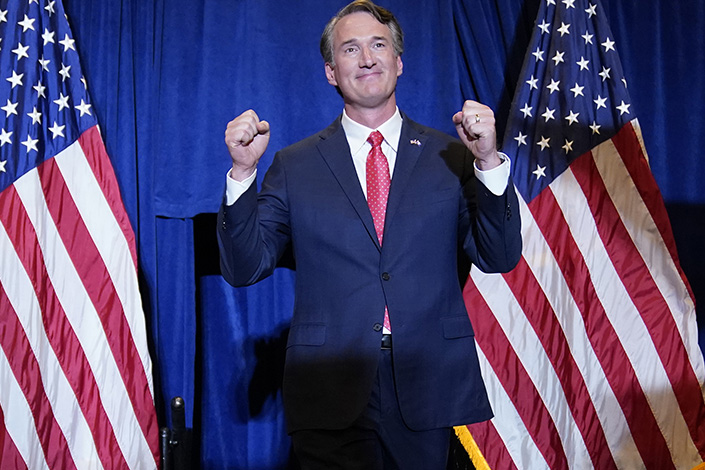
To what extent will a Republican victory in Virginia’s governor race influence U.S.-China relations?
When people argue that all politics is local, they are only partly right. Republican Glenn Youngkin’s victory over incumbent Terry McAuliffe in the Democratic-leaning Virginia governor’s race appears, at first glance, to have a lot to do with party politics in the United States. Republicans now think they have a new template for regaining control of Congress next year, or even the White House in 2024. Meanwhile, Democrats have grown concerned or even scared that the worst is yet to come.
There is much analyses on the race implications for Republicans and Democrats, but I hope to draw attention to its potential ramification for the evolving U.S.-China relationship.
First of all, if history serves as a guide, the incumbent party will dictate the course of bilateral relations on the U.S. end, despite the fact that intense competition with a rising China has increasingly become one of the rare issues of consensus holding U.S. political rivalries together. If Mr. Youngkin’s victory in Virginia gives the GOP a roadmap to 2024, the unmistakable message is that the Trumpian party could still turn out not just die-hard Trump supporters but also independent voters, so long as the candidate is more sensible and behaves less like Trump. In other words, a Trumpian campaign-style — sans Trump himself — is a winnable formula in the years to come.
If the GOP could grab the White House from Democrats in 2024, the new president is set to take on China with a vengeance and, thus, more willing to “toss China around flippantly and injudiciously in support of political agendas in the U.S. and elsewhere in the world,” according to Jonathan Noble’s commentary in the South Bend Tribune. To my limited knowledge of Republican presidential candidates of 2024, I don’t see any of them as less ideologically driven or a less “transactional” in style than former President Trump.
Second, Youngkin’s victory has more to do with his culture war message. If trade relations and commercial ties still play the role of so-called ballast in the US-China ties, there will be more conservative U.S. political office holders who will be less likely to come to terms with an ideologically different China, despite the fact that a more progressive Democratic party is similarly prone to pick on China.
Last but not least, let us look at the other side of the coin. A potential change of administrations in Washington will make Chinese leaders think twice before spending their political capital to meet the U.S. halfway in areas such as cutting contributing more to cutting emissions of greenhouse gases, nuclear non-proliferation, anti-narcotics, and so on and so forth. As a result, China may look beyond the current U.S. administration to instead accumulate political capital with the next White House occupant.
In a globalized world, it is more accurate to state that all politics is local, but some politics knows no boundaries.
Huang Shan is deputy managing editor and editorial board member of Caixin Media.
The views and opinions expressed in this opinion section are those of the authors and do not necessarily reflect the editorial positions of Caixin Media.
If you would like to write an opinion for Caixin Global, please send your ideas or finished opinions to our email: opinionen@caixin.com
Get our weekly free Must-Read newsletter.







